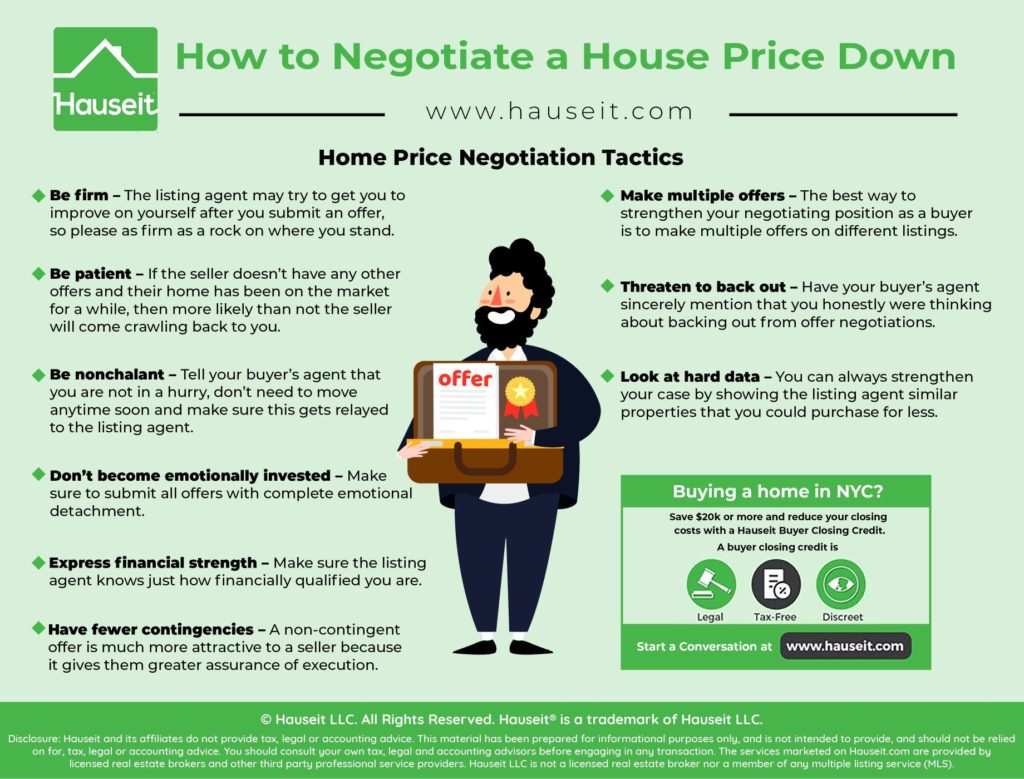How To Negotiate The Best Price On A Home
Finding your dream home only to be met with sticker shock can be a common experience. Yet, did you know that seasoned negotiators often save thousands of dollars on their final purchase price? Embracing negotiation as an art can truly transform the home-buying journey into a strategic victory.
Historically, homes listed in spring sell for higher prices, but understanding market trends can offer leverage. Data shows that making an initial offer 5-10% below the asking price can be quite effective. For the gamble to pay off, it’s crucial to communicate clearly and back your offer with compelling market evidence.
- Research the local real estate market to understand current trends and prices.
- Get a professional home inspection and appraisal for accurate value assessment.
- Set an initial offer with room for negotiation, typically 5-10% below asking price.
- Communicate persuasively, using data-driven arguments and being open to compromises.
- Learn from successful negotiation examples and adjust strategies accordingly.

How to negotiate the best price on a home
Securing the best price for a home starts with thorough research. Knowing the local real estate market trends can give you an upper hand. Look at recent sales data, average time on the market, and seasonal price fluctuations. This information helps you make an informed decision. It can also serve as a strong foundation for your negotiation strategy.
Understanding home valuation is another crucial step. Get a home inspection and, if possible, an independent appraisal. These evaluations reveal the home’s real worth and any hidden issues. Knowing these details allows you to adjust your offer price accordingly. The more information you have, the more confident you’ll feel during negotiations.
Perfecting your initial offer strategy can make or break the deal. Experts suggest starting 5-10% below the asking price. This buffer gives room for counteroffers without overstepping budget limits. It’s also important to justify your offer with market evidence. Sellers appreciate buyers who show they are well-prepared and serious.
Mastering persuasive communication is vital in negotiations. Speak clearly and confidently, and be prepared to walk away if needed. Flexibility can also help; perhaps the seller is more willing to negotiate closing costs or repair credits. Practicing these skills helps you stay calm and focused. A successful negotiation often hinges on effective communication and mutual respect.
Step 1: Research the Real Estate Market
Starting with market research is essential for any home buyer. Examine trends in the area where you’re interested in purchasing. Look for patterns in pricing, average days on the market, and seasonal variations. Online platforms like Zillow provide valuable data for this purpose. This research helps you understand the market’s ebb and flow.
Another critical part of market research is comparing similar properties. Identify homes that have sold recently and note their final sale prices. This comparison can reveal whether a listed price is fair or inflated. Pay attention to the features of these homes. Attributes like square footage, age, and renovations can significantly impact value.
Consider using online tools and resources to deepen your understanding. Websites like Redfin and Realtor.com offer neighborhood insights and price estimates. These tools can help you make informed decisions quickly. For a more thorough analysis, consult local real estate experts. They often have insider knowledge that isn’t available online.
Finally, don’t forget to explore future developments in the area. Planned infrastructure projects or new schools can affect property values. Stay updated by checking city planning websites and local news. Knowing what the future holds can help you make a better investment. The right market research lays the groundwork for effective negotiation.
Step 2: Understand Home Valuation
Grasping home valuation is crucial for making a smart offer. It involves understanding what makes a home worth its price. Appraisers look at factors like location, condition, and recent sales of similar homes. A house in a good school district, for instance, often has a higher value. Recognizing these nuances helps you negotiate effectively.
To dive deeper, obtain a home inspection and an appraisal. A professional inspector can uncover hidden issues, such as faulty wiring or plumbing leaks. An appraiser provides an unbiased estimate of the home’s true value. Both reports arm you with facts for negotiation. Armed with data, you’ll present a strong case for your offer.
Consider creating a list of factors impacting a home’s worth. These might include:
- Location and neighborhood amenities
- Square footage and layout
- Condition and any required repairs
This list can guide your understanding of what affects the price. Knowing these helps you weigh the home’s pros and cons.
Utilize online tools for quick valuation comparisons. Websites like HomeGain and Trulia provide estimates based on current market trends. These tools give a ballpark figure of the home’s value. When aligned with expert evaluations, they can confirm your research. Together, this knowledge puts you in a strong negotiating position.
Step 3: Perfect Your Initial Offer Strategy
Creating a strong initial offer strategy is essential. This approach sets the tone for negotiations. Make sure to consider market data and recent sales in the area. Aiming about 5-10% below the asking price can provide needed flexibility. This buffer allows room for adjustments without breaking your budget.
Justifying your offer is equally important. Sellers appreciate when buyers present well-researched offers. Using facts like recent comparable sales and pending repairs can strengthen your position. It shows you’re knowledgeable and serious. Additionally, it opens the door for respectful negotiations.
Knowing what to include in your offer is crucial. Consider adding contingencies for financing, inspections, or appraisals. These clauses protect your interests and add confidence to your offer. Common contingencies include:
- Inspection contingency
- Financing contingency
- Appraisal contingency
Each option plays a part in ensuring a fair deal for both parties.
Staying calm and flexible is key to a successful offer strategy. Be prepared for counteroffers and know your limits. Understanding what you’re willing to compromise on will help in negotiations. Whether it’s adjusting the closing date or renegotiating minor repairs, being flexible can make a big difference. This approach often leads to a win-win scenario for both buyer and seller.
Finally, always express genuine interest in the property. Sellers appreciate when they see enthusiasm and commitment from potential buyers. This can factor into their decision-making process. A positive attitude and transparency can build trust. This trust can pave the way for a smoother negotiation process.
Step 4: Master the Art of Persuasive Communication
Persuasive communication is key in negotiations. It involves clear and confident speech. Begin by outlining your main points. Keep them simple yet impactful. Practice to sound natural and assured.
Active listening is just as important in persuasive communication. Pay attention to the seller’s words and concerns. This shows respect and builds rapport. Respond thoughtfully to assure the seller you understand their position. Engaged listening often leads to more productive discussions.
Using positive language can have a huge impact. Instead of focusing on negatives, highlight benefits. Words like “opportunity” and “value” can make discussions more productive. This approach keeps the mood optimistic and focused on solutions. Sellers are more likely to respond positively to such language.
Body language plays a crucial role in negotiations too. Maintain eye contact and a friendly posture. These non-verbal cues build trust and confidence. Convey sincerity and openness to make the seller feel at ease. People are more receptive when they feel the other party is genuine.
Prepare to handle objections skillfully. When faced with resistance, acknowledge and address concerns calmly. Use facts and figures to back your arguments. This thoughtful approach can help turn objections into opportunities for agreement. Understanding both sides can lead to finding common ground.
Step 5: Learn from Successful Negotiation Case Studies
Studying successful negotiation case studies offers valuable insights. Real-life examples show how strategies and techniques are applied effectively. These stories reveal what worked and what didn’t, serving as practical lessons. They often highlight common tactics and creative solutions. Learning from these cases helps in understanding diverse negotiation scenarios.
One case might involve a family purchasing a home in a competitive market. By researching property histories and applying market data, they made a compelling offer. Their strategy included a personal letter to the seller, expressing love for the home. This emotional connection sometimes sways decisions. Sellers appreciate knowing their home will be well-cared for.
Another case may illustrate how a buyer dealt with tough competition. They used expert negotiation skills to stand out among multiple offers. Offering flexibility on the closing date provided an edge. This adaptability showed cooperation and understanding of the seller’s needs. Listening and offering solutions helped secure the deal.
| Negotiation Aspect | Successful Strategy |
|---|---|
| Initial Offer | Competitive yet realistic, supported by data |
| Buyer’s Edge | Flexibility and emotional connection |
| Closing the Deal | Addressing seller’s needs creatively |
Analyzing these case studies offers a clearer picture of how different strategies come together. Each successful negotiation brings its own lessons. By observing these practical examples, buyers can be better prepared. Equipped with insights, thoughtful negotiation becomes more successful. Every case study adds a layer of knowledge to the art of negotiation.
Tools and Resources for Home Price Negotiation
The right tools and resources can significantly boost your home price negotiation skills. Start with online platforms like Zillow and Redfin. These sites provide essential data, including property histories, recent sales, and market trends. Such information helps in making informed offers. Knowing your market is a powerful advantage.
Hiring a skilled real estate agent can also be a game-changer. Agents have access to the Multiple Listing Service (MLS), which gives up-to-date property listings and details. Their expertise can guide you through complex negotiations with ease. They understand local markets better than most apps or websites. This expert knowledge is invaluable when crafting your offer strategy.
| Resource | Purpose |
|---|---|
| Zillow | Market research and property history |
| Redfin | Trends analysis and pricing insights |
| MLS via Agent | Detailed property info and expert advice |
Navigating legal documents is part of every home purchase process. Consider using templates from trusted real estate websites or consulting with a lawyer for custom needs. Understanding contracts ensures you’re aware of all terms before sealing the deal. Being informed about contingencies, closing costs, and timelines protects you from surprises.
An often-overlooked resource is community reviews or forums. Platforms like Nextdoor offer insights into neighborhood dynamics directly from residents. Things that might not appear in official documents, such as noise levels or community events, are discussed here. These anecdotal pieces of information can help determine if an area suits your lifestyle before committing financially.
Your smartphone itself can be another tool in the negotiation process! Use apps for budgeting to make sure you’re on track financially throughout the negotiation phase. Reminders keep you organized so nothing falls through the cracks while juggling various components involved in buying a house! With comprehensive resources at hand, tackling any challenges becomes far more manageable.
The impact of Proper Negotiation on Final Home Price
Proper negotiation can significantly affect the final home price. A well-negotiated deal can save thousands of dollars. This means more money for moving expenses or future home improvements. Buyers who understand negotiation tactics have a clear advantage. Mastering this skill can turn a good deal into a great one.
Effective negotiation relies on market knowledge and clear communication. Knowing current trends helps buyers decide the right time to make an offer. By leveraging such information, buyers can convince sellers to agree to better terms. Clear communication ensures both parties are on the same page. Misunderstandings can lead to complications or missed opportunities.
Using a table, here’s a quick look at how negotiation affects pricing:
| Negotiation Focus | Potential Impact |
|---|---|
| Initial Offer | Sets the starting point for saving |
| Counter Offer | Refines terms and conditions |
| Contingencies | Protects buyer interests |
Buyers and sellers can also negotiate extras or improvements. Things like covering closing costs or including appliances often come up in negotiations. These could translate into substantial savings. Adjustments make the deal more appealing without altering the core price too much. Smart negotiations mean both price and terms benefit the buyer.
Real-life examples provide strong evidence of effective negotiation. Many homeowners have secured homes well below list price by applying sound strategies. Learning from such cases offers valuable insights for future buyers. These stories are proof that proper negotiation isn’t just a skill, but a vital tool in purchasing a home. With practice, anyone can learn to negotiate effectively.
Mistakes to Avoid During Home Price Negotiation
Avoiding common mistakes during negotiation can save you both stress and money. One big mistake is failing to research the market. Without understanding comparable home prices, you might make an unrealistic offer. Sellers take informed buyers more seriously. Knowledge equips you with the tools to negotiate effectively.
Emotions can also interfere with negotiation success. Buying a home is an emotional journey, but letting feelings drive decisions could backfire. Stay calm and focused, sticking to your budget goals. Do not let excitement or pressure lead to a hasty decision. Rationality often guides better outcomes.
Overlooking contingencies is another common pitfall. These are important clauses that can protect your interests. Consider including:
- Inspection contingency
- Mortgage contingency
- Appraisal contingency
Each ensures that you aren’t locked into a deal that isn’t in your best interest.
Poor communication can derail negotiations quickly. Make sure your intentions and terms are understood clearly by both parties. Misinterpretations can lead to delays or failed deals. Maintaining transparency helps build trust with the seller. A clear dialogue often results in smoother negotiations.
Lastly, being inflexible is a mistake buyers might regret. Flexibility in areas like closing dates or minor repairs can make a significant difference. Adaptability could lead to offers being accepted more readily. This strategy often creates a win-win situation. Being open-minded can benefit both you and the seller.
Frequently Asked Questions
Delving into the art of home buying can often raise several questions. Navigating price negotiations successfully requires knowledge and a strategic approach.
1. What factors influence the home’s asking price?
The asking price of a home is influenced by factors such as location, amenities, and market demand. Proximity to schools, public transportation, and shopping centers can increase a property’s value. Additionally, homes in established neighborhoods or those undergoing gentrification may see higher asking prices.
Another key factor is the current real estate market conditions. In a seller’s market, where demand surpasses supply, prices tend to be higher. Conversely, in a buyer’s market, with more available homes, prices might be more negotiable. Understanding these dynamics is crucial for any homebuyer.
2. How does a home inspection affect negotiations?
A home inspection can significantly impact negotiations by revealing potential issues. Discovering problems like structural damage or outdated systems can lead to price adjustments. Buyers often leverage inspection findings to request repairs or ask for price reductions.
Additionally, a thorough inspection ensures that buyers are aware of what they’re investing in. Knowing the property’s condition helps in deciding whether to proceed with the purchase or negotiate further. This transparency builds confidence in the buyer’s decision.
3. Why is having a real estate agent helpful in negotiations?
A real estate agent brings expert knowledge and negotiation skills to the table. They provide valuable insights into market trends and comparables, helping buyers make informed offers. Agents typically understand the nuances of deal-making and can effectively communicate on behalf of the buyer.
Moreover, agents have access to exclusive listings and networks. They can provide guidance on property value and identify potential red flags during the process. An experienced agent acts as a navigator, streamlining the home-buying journey and ensuring the buyer’s interests are well represented.
4. What is the role of contingencies in a home offer?
Contingencies are conditions that must be met for a home sale to close. Common contingencies include passing a home inspection, securing financing, and appraising at the sale price. They protect buyers from unforeseen issues that might affect their decision to proceed.
If a contingency isn’t met, the buyer usually has the option to back out or renegotiate terms. This safeguard ensures that buyers aren’t locked into unfavorable conditions. Having contingencies in place provides peace of mind during the purchasing process.
5. How can understanding market trends benefit homebuyers?
Understanding market trends empowers buyers with crucial information when planning their purchase. Recognizing patterns in home prices, interest rates, and inventory levels helps buyers time their offers better. Analyzing these trends provides an advantage in determining fair market value.
Furthermore, being informed about future developments or neighborhood changes can influence buying decisions. Anticipating growth in an area could lead to smart investments. Ultimately, knowledge of market trends aids in making well-timed, strategic decisions in home buying negotiations.
Wrapping Up: Savvy Home Buying
Navigating the world of home price negotiation requires a mix of preparation, strategy, and adaptability. By understanding market trends and mastering negotiation tactics, buyers can secure favorable deals. Engaging the right tools and resources empowers buyers to make informed decisions. Each step taken thoughtfully enhances the likelihood of achieving the desired outcome.
Properly leveraging available information and expert guidance can lead to significant savings and satisfaction. Remember, effective communication and flexibility are your allies in this journey. Embrace the learning process as you go, because each negotiation adds to your expertise. Armed with knowledge and confidence, home buyers can transform opportunities into rewarding experiences.


